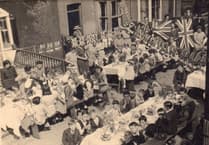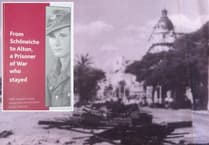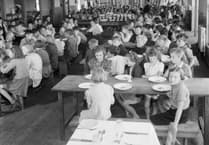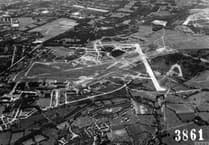In today’s Peeps into the Past we continue our look back at the remarkable life of Willi Gerlach, the German prisoner-of-war who stayed in Alton.
Last week’s article (tinyurl.com/wgerlach) finished with Corporal Gerlach surviving a brutal three-day battle with the advancing US forces near Orleans.
We pick up the story on August 24, 1944, when Willi and his comrades, worn and battered, surrendered to French resistance fighters the ‘Maquis’.
Their capture was harsh: stripped of all possessions, with photographs of loved ones torn up before their eyes, they were marched to a nearby town and confined in a bakery for 24 hours before being transported towards Paris.
The newly liberated French populace, still raw from years of occupation, expressed their anger towards the captured Germans. As Willi and the other POWs passed through the streets, they were met with jeers and had objects thrown at them.
Eventually, they were taken to an open field, joining about a thousand other captured German troops, including many who were injured.
Despite the hostility, American soldiers provided them with biscuits and cigarettes, and by early September, tents were erected to shelter them.
Willi’s ordeal did not end there. The French continued their retribution, with one incident involving a partisan woman who whipped him, seeking vengeance for her brother's death.
The POWs were put to work filling jerrycans with petrol to support the Allied advance, a task that exacerbated an old leg injury for Willi. But a compassionate American doctor intervened, sending him to a hospital in Paris where he received his first proper wash in weeks.
It was during this time that Willi first learned of the atrocities committed in the concentration camps when a doctor threatened him with the same treatment inflicted by the Nazis, a shocking revelation that left a deep impact on him.
After recovering, Willi was sent to a field hospital on the Cherbourg peninsula, and later, along with other POWs, was tasked with clearing military debris on the invasion beaches.
On October 3, 1944, Willi and around 350 others were transported to England on a rough Channel crossing aboard a landing craft. Their arrival marked the beginning of a new chapter in Willi’s life, as he was moved from one camp to another across the UK.
Initially held in Scotland, Willi was soon transferred to a racecourse near London, possibly Sandown Park, before being moved to an old POW camp in Bury, Lancashire.
During his time in captivity, he and his fellow prisoners were treated relatively well by the British. They were provided with decent food, daily showers, and paid work opportunities. Willi took part in a variety of activities, including football, chess, and boxing.
As the war in Europe drew to a close in May 1945, Willi was relocated to a re-education camp in Mortimer, near Reading. It was here that he was confronted with the full horror of the Nazi regime through films showing the concentration camps. The reality of what his country had done weighed heavily on him.
Required to stay in Britain and work for two more years, Willi was sent to work on various farms around Alton, where he found a degree of stability and purpose.
By November 1945, he was living at Thedden Grange, near Alton, working on Greenmount Farm in Shalden. It was during this time that he re-established contact with his family, who had suffered greatly under Russian occupation in their homeland.
Determined to build a new life for himself, Willi decided to stay in England. His hard work on the farm, where he often laboured from dawn until late at night, eventually earned him his freedom. In October 1947, he was demobbed and continued working as a cowman in Shalden, his pay finally reflecting his efforts.
We will continue Willi Gerlach's story, as captured in Ian Fleming’s From Schoneiche to Alton: A Prisoner of War Who Stayed’, in next week’s Peeps into the Past.









Comments
This article has no comments yet. Be the first to leave a comment.